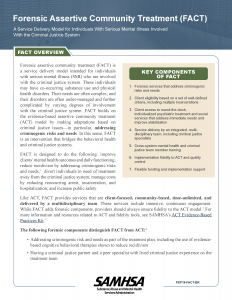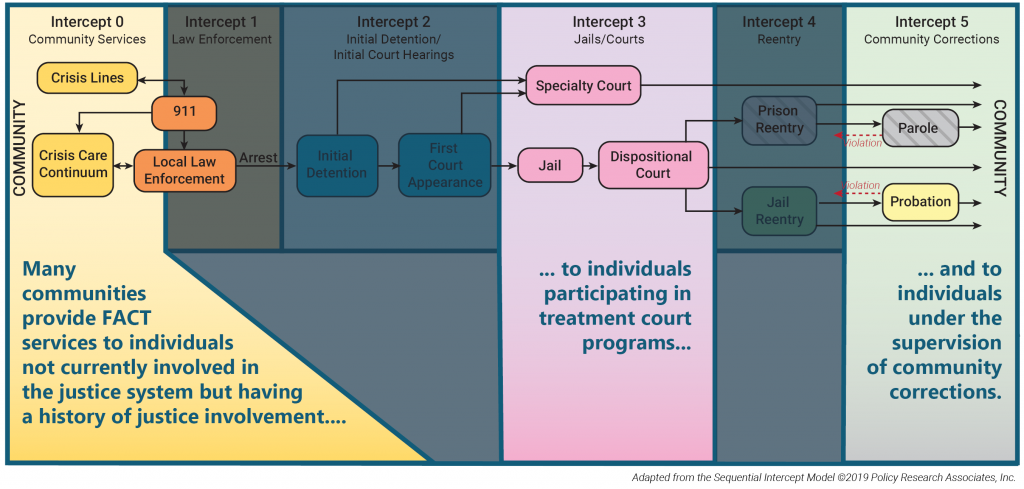 Many communities across the United States wrestle with the challenge of providing services to individuals who are justice involved and experiencing serious mental illness (SMI) or co-occurring disorders. Forensic assertive community treatment (FACT) teams are one service option for providing a level of care that can stabilize an individual, reduce further justice involvement, and lessen the likelihood of further hospitalization. Framing this approach within the Sequential Intercept Model, many communities provide FACT team services at Intercept 5 (for individuals under the supervision of community corrections), Intercept 3 (for individuals participating in treatment court programs), or Intercept 0 (for individuals not currently involved in the justice system but having a history of justice involvement). By providing this critical level of care at these intercepts, communities may see a reduction in the number of frequent utilizers of their justice and emergency response systems.
Many communities across the United States wrestle with the challenge of providing services to individuals who are justice involved and experiencing serious mental illness (SMI) or co-occurring disorders. Forensic assertive community treatment (FACT) teams are one service option for providing a level of care that can stabilize an individual, reduce further justice involvement, and lessen the likelihood of further hospitalization. Framing this approach within the Sequential Intercept Model, many communities provide FACT team services at Intercept 5 (for individuals under the supervision of community corrections), Intercept 3 (for individuals participating in treatment court programs), or Intercept 0 (for individuals not currently involved in the justice system but having a history of justice involvement). By providing this critical level of care at these intercepts, communities may see a reduction in the number of frequent utilizers of their justice and emergency response systems.
In many communities, a high-fidelity assertive community treatment (ACT) team can deliver services effectively to the same population that FACT is designed to serve. But while ACT team members may only occasionally work with the criminal justice system in the coordination of services, FACT teams have staff with specialized expertise in working with criminal justice systems and people who are justice involved. These team members can navigate differences between mental health and criminal justice systems and administer interventions to address criminogenic risk.[1]
FACT, adapted from ACT, is an intensive service-delivery model for people with serious mental illness who are involved in the criminal justice system and may also have co-occurring substance use and physical health disorders. The FACT model is designed to prevent recidivism and hospitalization for these individuals by addressing criminogenic risk and needs, as well as physical and behavioral health needs, using a coordinated, time-unlimited treatment plan. The FACT model is enabled by criminal justice, mental health, and substance use agencies offering coordinated, community-based, diversion-focused treatment and services for justice-involved people with SMI and co-occurring disorders.[2]
Preliminary research suggests that FACT can be effective in reducing recidivism among people with SMI who are justice involved but that it is critical to create program models with long-term financial sustainability.[3] Because delivering the model requires significant resources, communities considering adopting the FACT model should weigh the operational costs of supporting a FACT team against potential savings from reductions in further justice involvement and emergency department usage.
SAMHSA has released a new publication that provides behavioral health and criminal justice professionals with key information about FACT. Access this brief today and learn more about this promising practice for better serving our communities.
[1] Cuddeback, G. (2018, March). A literature review of forensic assertive community treatment for justice-involved people with serious mental illness: Directions for practice, policy, and research. Unpublished paper presented at the Forensic Assertive Community Treatment (FACT) Expert Panel Meeting hosted by Substance Abuse and Mental Health Services Administration, Rockville, MD.
[2] Ibid.
[3] Ibid.


